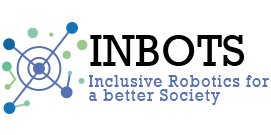Social Robotics
.
Europe is well placed to become a leader in the use of interactive robots, but developments are unevenly distributed among different sectors and information about the spread and use is inadequate. The inventory of best practises in different parts of Europe shows different degrees of maturity in different sectors. In some sectors, the development is far advanced, in others there is a promising development or a potential for development. Lack of access to information about social uptake and acceptance Europe-wide is a problem that tend to lower the speed and target fulfilment

To learn more about Societal & socio economic aspects in interactive robotics, click below to read the INBOTS White Paper
Our Goal
.
INBOTS will promote community support and outreach, in order to promote robotics uptake by general public. The project will also collect best practices of new robotic applications, grasp the societal values, needs and expectations of robotics and what specific robotic applications are needed and identify a set of key areas where potential to meet society’s needs is great and clear. Besides, Inbots will promote interest and acceptance of robotics and bring attention to the connection between robotics development and societal development. The partner leading these activities is the Royal Institute of Technology in Stockholm
Thanks to the inclusion of different partners with expertise in education and dissemination, several tasks aimed at describing and illustrating interactive robotics applications in the manufacturing, healthcare and domestic domains will be developed.
.

Social and Economic Uptake
Interactive robots have reached different stages of maturity in a variety of sectors. Available statistics and best practices show that industry is at the leading-edge including manufacturing, logistics, rescue activities, exoskeletons and education. Other promising areas starting to use interactive robots are health care including social care, robotized assistance for surgery and assistance to compensate for physical losses.
On the other hand, the nature of work in modern economies is being transformed as a result of ongoing trends such as automation, urbanization and globalization, and workforce ageing, sparking public debate and concern over the future of work. This part of the Preliminary Report sketches an overview of these trends with a focus on digitalization, their implications for work and workers, and the societal challenges they bring. Lastly, we outline some avenues for policy discussion.
.
Ethics
One can differenciate descriptive and normative forms of standardization. Whereas descriptive standardization relates to a wider disciplinary range including sociology, political sciences or psychology, normative ethics is a unique philosophical way of critically standardizing both moral reasoning and moral values
.
Events
At INBOTS we are celebrating continuous debates on all this issues, check out CALENDAR of EVENTS to participate.
| M | T | W | T | F | S | S |
|---|---|---|---|---|---|---|
| 1 | 2 | 3 | 4 | 5 | 6 | 7 |
| 8 | 9 | 10 | 11 | 12 | 13 | 14 |
| 15 | 16 | 17 | 18 | 19 | 20 | 21 |
| 22 | 23 | 24 | 25 | 26 | 27 | 28 |
| 29 | 30 | |||||
Related news
- Health care includes advanced robots that have been used for a while such as robotized assistance for surgery and robots for social careOne of the objectives of INBOTS is to promote societal and socio-economic uptake of robotics. The project has a specific work package for this purpose, led by KTH Royal Institute of Technology. This
- Will a robot be the next Nobel Prize in Literature?At INBOTS we are making a deep study on how interactive Robotics evolves and the effects of the conjunction of this technology with Artificial Intelligence in the different spheres of our daily life.
- INBOTS at the CYBATHLON SymposiumNow in a fully virtual, interactive format, the CYBATHLON Symposium has taken place on September 17 and 18 in spite of the pandemic crisis running. The Symposium is a conference format that adds
Organisations commited with the community
Project members

.
Get in touch with us !
.
.
